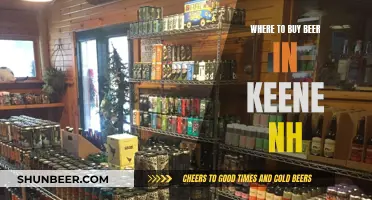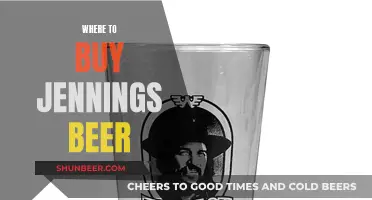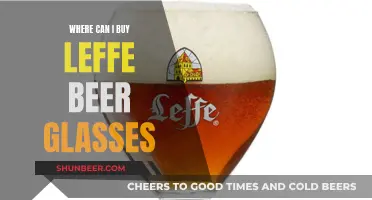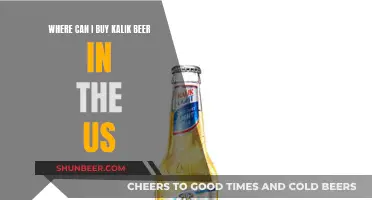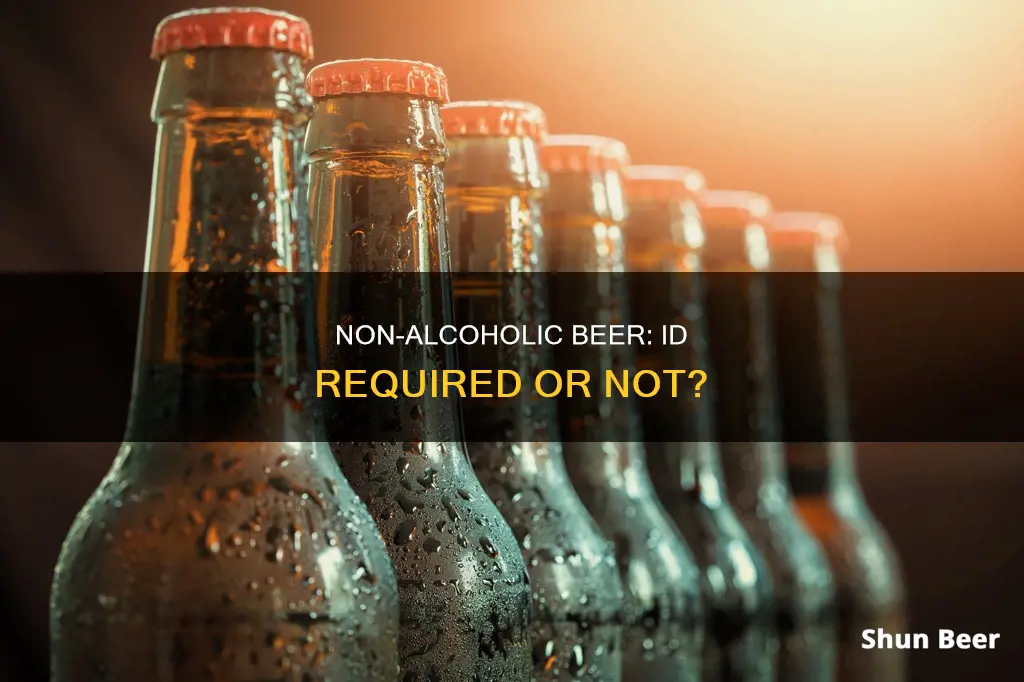
Whether or not you need to show ID when buying non-alcoholic beer depends on where you are. In the US, non-alcoholic beer is regulated by the Federal Alcohol Administration Act, but the laws around drinking age are set by each state. Some states allow the purchase of non-alcoholic beer under the age of 21, while others do not. For example, Oregon, West Virginia, and Wyoming only permit the purchase of non-alcoholic beer by those over 21 if it contains at least 0.5% ABV. In the UK, you do not need ID to buy non-alcoholic beer, but you may still be asked for it by retailers.
| Characteristics | Values |
|---|---|
| Need for ID when buying non-alcoholic beer | Varies by region and retailer |
| Reasons for ID requirement | To avoid promoting alcohol to children and to make it easier to enforce rules regarding alcoholic drinks |
| Alcohol content in non-alcoholic beer | Up to 0.5% ABV |
| Alcohol content in alcoholic drinks | Typically 4-6% ABV |
| Alcohol content in everyday foods | Ripe bananas can contain up to 0.4% ABV, and hamburger buns can contain up to 1.28% ABV |
| Federal regulations in the US | Non-alcoholic beers are regulated by the Federal Alcohol Administration (FAA) Act, which applies to all malt beverages regardless of alcohol content |
| State regulations in the US | Vary by state; some states allow purchase under 21, while others require buyers to be over 18 or 21 |
| Examples of states with specific rules | Oregon, West Virginia, and Wyoming: require age verification for drinks containing at least 0.5% ABV; Ohio: requires buyers to be over 18 |
What You'll Learn
- Non-alcoholic beer is regulated by the Federal Alcohol Administration Act (FAA)
- Non-alcoholic beer often isn't served outside of licensing or alcohol sale hours
- Non-alcoholic beer is treated the same as alcoholic beer to avoid promoting alcohol to children
- Non-alcoholic beer is treated the same as alcoholic beer to make it easier to enforce rules regarding alcoholic drinks
- Non-alcoholic beer is not the same as alcohol-free beer

Non-alcoholic beer is regulated by the Federal Alcohol Administration Act (FAA)
The Federal Alcohol Administration Act (FAA) regulates malt beverages, regardless of their alcohol content, if they meet the Act's requirements of containing some malted barley, some hops (or hop parts or products), and having been subject to fermentation. Non-alcoholic and alcohol-free beers are produced like conventional beer and then de-alcoholized, so they fall under the FAA's labelling and advertising jurisdiction.
The FAA provides for the regulation of those engaged in the alcohol beverage industry and for the protection of consumers. To ensure the integrity of the industry, the FAA includes provisions to require a permit for those who engage in the business as a producer, importer, or wholesaler of alcohol beverages, to issue, suspend, and revoke permits, and to ensure the integrity of the industry by preventing persons who are not likely to operate in accordance with the law from entering the trade.
To protect consumers, FAA Act provisions ensure that the labelling and advertising of alcohol beverages provide adequate information to the consumer concerning the identity and quality of the product, and prevent misleading labelling or advertising that may result in consumer deception regarding the product. The FAA also includes provisions to preclude unfair trade practices, such as the regulation of marketing promotional practices concerning the sale of alcohol beverages, and the regulation of practices such as exclusive outlets, tied house arrangements, commercial bribery, and consignment sales.
Although non-alcoholic beer is not considered "beer" under the Internal Revenue Code (IRC), it is still subject to the FAA's labelling and advertising jurisdiction. This is because the FAA's definition of "malt beverage" does not include any minimum or maximum threshold of alcohol content.
The FAA's definition of "malt beverage" is "a beverage made by the alcoholic fermentation of an infusion or decoction, or combination of both, in potable brewing water, of malted barley with hops, or their parts, or their products, and with or without other malted cereals, and with or without the addition of unmalted or prepared cereals, other carbohydrates or products prepared therefrom, and with or without the addition of carbon dioxide, and with or without other wholesome products suitable for human food consumption."
The IRC defines "beer" as "beer, ale, porter, stout, and other similar fermented beverages (including sake or similar products) of any name or description containing one-half of 1 percent or more of alcohol by volume, brewed or produced from malt, wholly or in part, or from any substitute therefor."
The difference in these definitions means that a fermented beverage that is brewed from a substitute for malt (such as rice or corn) but without any malted barley may constitute a "beer" under the IRC but does not fall within the definition of a "malt beverage" under the FAA. Similarly, a fermented beverage that is not brewed with hops may fall within the IRC definition of "beer" but also falls outside of the definition of a "malt beverage" under the FAA.
Victoria Gardens AMC: Beer Availability and Movie Experience
You may want to see also

Non-alcoholic beer often isn't served outside of licensing or alcohol sale hours
Non-alcoholic beer is often treated the same as regular beer by pubs, bars, and retailers. This means that, in addition to ID checks, non-alcoholic beer is often not served outside of licensing or alcohol sale hours.
In many places, non-alcoholic beer is not legally considered alcohol if it contains less than 0.5% ABV. Despite this, retailers often voluntarily restrict the sale of non-alcoholic beer to minors to avoid promoting alcohol to children and to make it easier to enforce rules regarding alcoholic drinks.
The reasoning behind these restrictions is that non-alcoholic beer packaging and the drink itself are almost indistinguishable from alcoholic beer. Additionally, many non-alcoholic beers are produced by companies that also produce alcoholic drinks. As a result, allowing minors to buy non-alcoholic beer could indirectly promote similar products that contain alcohol.
Furthermore, treating non-alcoholic beer the same as alcoholic beer makes it easier for pubs, bars, and retailers to enforce rules regarding alcoholic drinks. This is especially relevant in pubs and bars, where owners are responsible for what people drink on the premises. By treating non-alcoholic beer the same as alcoholic beer, staff can more easily monitor what customers are drinking and ensure that alcoholic drinks are not accidentally served to minors.
While getting asked for ID when buying non-alcoholic beer can be frustrating, retailers are ultimately focused on society's best interests by voluntarily restricting its sale to minors. Their aim is to protect children from the dangers of alcohol.
Buying Beer in Connecticut on New Year's Day
You may want to see also

Non-alcoholic beer is treated the same as alcoholic beer to avoid promoting alcohol to children
Non-alcoholic beer is often treated the same as alcoholic beer in pubs, bars, and shops, meaning that it is not sold to those who cannot prove they are of legal drinking age. This is largely to avoid promoting alcohol to children.
While non-alcoholic beer typically contains up to 0.5% ABV, and in some cases 0%, it is still regulated under the Federal Alcohol Administration (FAA) Act in the United States. This is because the FAA Act regulates all malt beverages, irrespective of alcohol content. As such, non-alcoholic beer is considered a "beer" in the eyes of the law.
However, the laws surrounding the purchase of non-alcoholic beer vary from state to state in the US. For example, in Oregon, West Virginia, and Wyoming, non-alcoholic beer is treated the same as alcoholic beer if it contains at least 0.5% ABV. In Ohio, the drinking age is 18, not 21. In the UK, you do not need ID to buy non-alcoholic beer, but some retailers may still ask for it.
Retailers may also treat non-alcoholic beer the same as alcoholic beer to make it easier to enforce rules regarding alcoholic drinks. The packaging of non-alcoholic beer is almost identical to that of alcoholic beer, so restricting the sale of non-alcoholic beer to minors helps to avoid accidentally selling alcoholic beer to minors by mistake.
Some people argue that non-alcoholic beer should not be restricted to minors, as many everyday foods and drinks, such as ripe bananas and bread, contain similar or higher amounts of alcohol and are not restricted. However, the argument for treating non-alcoholic beer the same as alcoholic beer to avoid promoting alcohol to children holds strong, with some companies, such as AB-Inbev and the Portman Group, having policies in place that cover the promotion and sale of non-alcoholic drinks to minors.
Buying Beer on New Year's Day in Texas: What's Allowed?
You may want to see also

Non-alcoholic beer is treated the same as alcoholic beer to make it easier to enforce rules regarding alcoholic drinks
Non-alcoholic beer is often treated the same as alcoholic beer, with many retailers and pubs choosing to restrict their sale to those who are under the legal drinking age. This is largely done to make it easier to enforce rules regarding alcoholic drinks.
The packaging of non-alcoholic beer is almost identical to that of alcoholic beer. In pubs and bars, it can be difficult for staff to distinguish between customers drinking alcoholic and non-alcoholic beer. By treating non-alcoholic beer the same as alcoholic beer, staff can more easily monitor what customers are drinking and ensure that rules regarding alcohol consumption are being followed.
In shops, point-of-sale systems can flag the differences between alcoholic and non-alcoholic beer to prevent the sale of alcoholic drinks to minors. However, this also means that non-alcoholic beer may not be sold to minors, even though it is not illegal in most regions.
Additionally, the Federal Alcohol Administration (FAA) Act regulates all malt beverages, including non-alcoholic beer, which fall under the generic "beer" umbrella. This further contributes to the treatment of non-alcoholic beer as equivalent to alcoholic beer in terms of age restrictions.
While this may be frustrating for those who wish to purchase non-alcoholic beer but are underage, retailers are focused on society's best interests by voluntarily restricting the sale of these products. Their ultimate aim is to protect children from the potential dangers of alcohol and to avoid promoting alcohol to minors.
Last-Minute Beer Runs on New Year's Eve: What's Open?
You may want to see also

Non-alcoholic beer is not the same as alcohol-free beer
In many places, you need to be of legal drinking age to buy non-alcoholic beer, even though it typically contains less than 0.5% alcohol by volume (ABV). This is because the drinks are treated the same as alcoholic drinks in many pubs, bars, and shops. However, the rules vary depending on the region and retailer. For example, in the US, the law differentiates between "non-alcoholic" and "alcohol-free" drinks.
Non-alcoholic Beer
In the US, non-alcoholic is a legal term for malt beverages containing less than 0.5% ABV. While non-alcoholic beer typically contains very little alcohol, some small amounts may remain. For example, a non-alcoholic beer may contain approximately one gram of alcohol, compared to 14 grams in a regular beer.
Alcohol-Free Beer
In the US, a drink must contain 0.0% ABV to be labelled as "alcohol-free". To qualify for this label, breweries must send samples to the Alcohol and Tobacco Tax and Trade Bureau (TTB) for approval.
Non-alcoholic vs Alcohol-Free Beer
While the terms "non-alcoholic" and "alcohol-free" are often used interchangeably, they have distinct meanings that vary by region. In the US, the law differentiates between the two, while in the UK, the Department of Health & Social Care's guidelines state that you cannot label beer as "non-alcoholic". Instead, the term "de-alcoholised" is used for beverages with an ABV of 0.5%, and "alcohol-free" is reserved for drinks with less than 0.05% ABV.
Buying Beer in Kentucky: Labor Day Shopping
You may want to see also
Frequently asked questions
It depends on where you are. In the US, non-alcoholic beers are regulated by the Federal Alcohol Administration Act, but the laws around the purchase age vary by state. For example, in Oregon, West Virginia, and Wyoming, you need an ID if the drink contains 0.5% alcohol by volume or more, while in Ohio, you only need to be over 18. In the UK, you don't need an ID to buy non-alcoholic beer.
Non-alcoholic beers are still considered "beer" under the Federal Alcohol Administration Act in the US, even though they contain less than 0.5% alcohol by volume. This is because the Act regulates all malt beverages, regardless of their alcohol content. Additionally, retailers may want to avoid promoting alcohol to minors and make it easier to enforce rules regarding alcoholic drinks.
If you don't have an ID, you may be refused service, as retailers will want to ensure they are complying with the relevant laws and regulations.
In the US, the laws vary by state, so you'll need to check the specific rules for your state. In the UK, you don't need an ID to buy non-alcoholic beer, so you can purchase it from any retailer that sells it.



